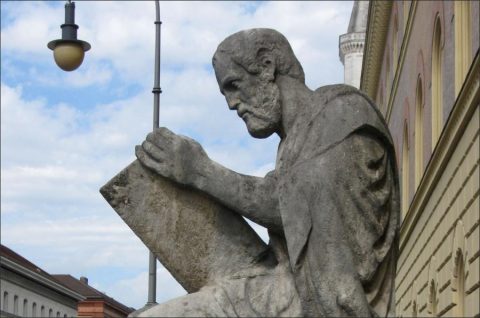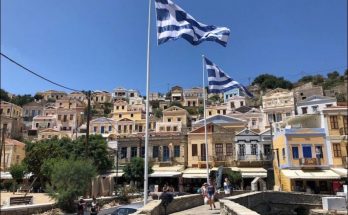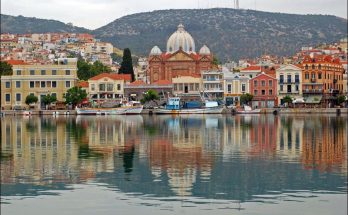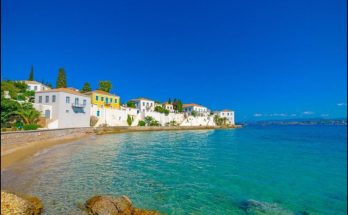Thucydides, who composed in what are now eight books a history of the ‘Peloponnesian War’ (431-404 B.C.), was born at Athens between 470 and 455 B.C. Through his father Olorus he was connected with Miltiades, the Marathonian hero, and inherited great wealth derived from the gold-mines of Scapté Hulé in Thrace. The rhetorician Antiphon and the philosopher Anaxagoras were probably among his teachers. We hear that as a boy he was present at a public reading given by Herodotus of his history, which so impressed the young Thucydides that he burst into tears, whereupon Herodotus congratulated Olorus upon his son’s bent for learning.
In 431 the great war broke out and Thucydides, realizing its importance, began at once a record of it. He suffered from the plague of 430, which slew so many thousands of Athenians, but survived to write a celebrated account of it in his Second Book. In 424 he commanded a squadron as ‘general’ (strategos) in the Northern Aegean. At this time the great Spartan, Brasidas, was performing notable exploits against Athens in the sea-board region of Thrace. His crowning feat was the capture of Amphipolis. Thucydides arrived too late to hold the town against him, and though he defended the neighbouring port of Eion with vigour and success, the Athenians punished him for the loss of Amphipolis by banishment which lasted twenty years.
This period he spent upon his history, mostly at his property in Scapté Hulé; but it is clear that he travelled for his information, and visited Sicily among other places. Returning to Athens after the end of the war, he was no doubt occupied with his history till he died, for the work was left unfinished: it stops at’ vents of 411 B.C., and the books which we possess are not fully revised. Ancient tradition says that he died by violence; the date is unknown, but he cannot have lived till 395 B.C., in which year occurred an eruption of Etna about which he knew nothing.
Thucydides is the earliest great Athenian prose-writer, his chief models being the Sicilian Gorgias and the Athenian Antiphon. But he owes far less to any model than to native genius. His manner is compressed and powerful, but often involved and difficult. These latter characteristics arise from two causes. Firstly, he insists on thinking out and expressing the exact and smallest details of an event, the finest tendrils of psychological causation. Secondly, since he wrote when there was practically no tradition of Attic prose, and when the study of Greek grammar was only beginning, he is capable, and probably unaware, of great harshness and incorrectness of syntax.
As an historical study the work is of vast importance: the author had at his command piercing sagacity, a truly philosophic temper, deep interest in his subject, clear understanding of what was relevant to it, power of judging evidence, leisure and means to travel, a great store of human and documentary evidence. But not all portions of his work are written on the same scale. It seems that, beginning at the outbreak of war, he made a continuous rough draft of all we possess.
From time to time certain episodes were elaborated into magnificently picturesque and poignant or exciting narratives, while other portions remained carefully written indeed, but in a more commonplace manner; the Eighth Book, for instance, received little of this final enrichment, so that some ancient critics regarded it as spurious, the work of Xenophon, Theopompus, or Thucydides’ own daughter, though the latter view is scouted by Marcellinus–‘ to imitate such nobility and art was beyond the nature of woman.’
The famous speeches (there are none at all in the Eighth Book). may well have formed a separate stage in this elaboration. Among the specially excellent passages above mentioned, we may point to his account of the Plague, the Escape from Plataea, the affair of Pylos and Sphacteria, and, from his account of the Sicilian Expedition, the immortal descriptions of the Last Sea-Fight and the Retreat from Syracuse.
The study of his aim and method cannot open better than by examination of his own words: ‘Thucydides, an Athenian, wrote the history of the war in which the Peloponnesians and the Athenians fought against one another. He began to write when they first took up arms, believing that it would be great and memorable above any previous war. For he argued that both parties were then at the full height of their military power, and he saw the rest of the Greeks either siding, or intending to side, with one of the other’.
‘As to the speeches which were made either before or during the war, it was hard for me, and for others who reported them to me, to recollect the exact words. I have therefore attributed to each speaker the sentiments proper to the occasion, expressed as I thought him likely to express them, keeping as closely as I could to the general purport of what was actually said. The events of the war I have not ventured to relate on any chance information, nor according to notions of my own; I have described only what I myself witnessed or learned from others of whom I made the most careful and particular inquiry.
The research was laborious, because eyewitnesses of the same events gave accounts which varied according to their partiality or memory. It may be that the absence of romantic charm will make my narrative poor hearing; but I shall be content if it is judged useful by those seeking exact knowledge of a past which (till human nature changes) is sure to repeat itself exactly or approximately. My history is an everlasting possession, not a prize-composition which is heard and forgotten’. ‘I lived through the whole of it, being of mature years for observation and applying my powers to the acquisition of exact knowledge. Moreover, it was my lot to be exiled from my country for twenty years after I held the command at Amphipolis, and associating with both sides, with the Peloponnesians quite as much as with the Athenians, because of my exile, I was a notably unharassed spectator’.
From these statements, and from the practice which they describe, we may take four points in an order of increasing importance. First, Thucydides arranges his story chronologically, ‘according to summers and winters’, and for this he has often been censured, because an important narrative is sometimes suspended while we read of slighter events elsewhere. But his main object is to give historical events in historical order–he is a scientist as well as an artist.
Secondly, he insists on the laborious acquisition, and the impartial sifting, of evidence. This method, obvious to us, was less obvious then. Thucydides plainly regards Herodotus as failing badly here–it is no doubt at Herodotus that he aims his famous sneer about ‘prize-compositions’–and though he is in this largely mistaken, he is right in proclaiming himself at variance with those who purveyed delightful but legendary narratives. A natural result of his patient impartiality was that some accused him of spite against his own country.
Thirdly, the speeches are much more important to his intention than the corresponding passages of Livy, for example. Couched for the most part in language abstract, terse, and difficult, they express, besides the general purport of what Alcibiades or Cleon really said, the historian’s own views on political science, morals, and psychology. Just as his fellow-countrymen the tragedians tend to reject in their ‘episodes’ the incidental chance of profound moralizing and emotional expression, reserving such matter for the definitely lyrical performances of the Chorus, so Thucydides refrains from the casual comment, the incidental moralizing, which events evoke from the modern historian, and canalizes such expression in the elaborate speeches which a crisis occasions.
Fourthly, one notes his dry reference to the absence of legendary or romantic charm. He will owe nothing to the supernatural persons and events of Greek legend. Of all Athenian writers, Thucydides stands perhaps closest to the spirit which Pericles and his friend Anaxagoras, the great rationalist from Clazomenae, impressed upon Athenian art and thought. Thucydides sets out to explain human events in terms of humanity. Never does he consent to account for anything, however vast or mysterious, by ‘the will of the gods’: he points to over-population, or jealousy, or some other cause familiar in the daily life of his readers.
This is emphatically not because he is an atheist: he is an agnostic-since trustworthy experience and research tell him nothing about the gods, he is silent as to their activities. Nevertheless, he is aware that his science cannot account for everything. Though he blames Nicias for superstition in wrecking a vital plan through the dread inspired by an eclipse, he incessantly notes the power of Chance to thwart the best sagacity of Man. His account of the Plague is in this regard, as in others, deeply interesting.
How was it caused? Why did it come upon Athens? For once Thucydides has no scientific theory, and he leaves the door open for a supernatural cause: writing of the arrival of the plague, he employs a notable and rare word, encataskepsai (‘to swoop down upon’) which is used by Aeschylus (Persae, 514) for the miseries which God has hurled down upon the Persians. About oracles he is plainly sceptical. Eclipses, which terrified the vulgar, he regards as natural phenomena. ‘There was an eclipse of the sun at the time of the new moon, apparently the only time at which it is possible’. Cautious, reserved as he is, Thucydides nevertheless understands and feels human emotion; but instead of telling his readers what to feel, he is generally content to give them the opportunity of feeling.
No denunciation of cynical tyranny holds and communicates such searing hatred as his celebrated, ostensibly quite objective, Melian Dialogue. The little island of Melos-still famous as the first abiding-place of the ‘Venus of Milo’–being offered the choice between ruthless war and submission to Athenian tyranny, her spokesmen at length desperately appeal to the righteousness of Heaven. Whereupon the Athenian envoys urbanely respond: ‘As for the gods, we expect to have quite as much of their favour as you: for we are not doing or claiming anything which goes beyond common opinion about divine power or men’s desires about human things. Of the gods we believe, and of men we know, that by a law of their nature, wherever they can rule, they will.’ An amazingly sincere passage!
Thucydides faces the facts of human depravity by portraying men–his own countrymen–who avow their own depravity with a candour like his own. To his impartial eye it matters little whether they are his countrymen or not; the murderous horrors of party strife in Corcyra form the occasion for his famous disquisition upon the progressive degradation caused by the war.
But whatever he thought of individual Athenians, even of national acts, Athens was to him the splendid fountain and symbol of spiritual light. For the Periclean Athenian, indeed, the City took the place of those equivocal deities whose very existence he must doubt. This is the root-idea of that glorious Funeral Speech which the historian reports as an utterance of Pericles; for example:
‘I would have you day by day fix your eyes upon the greatness of Athens, until you become her lovers; and when you are impressed by her glory, reflect that this has been acquired by men of daring who know their duty, who in action were sustained by their honour, and who, if ever they failed in an enterprise, would not allow their virtues to be lost to their country, but gave their lives as the fairest offering which they could present at her feast. . . . The whole earth is the sepulchre of famous men: not only are they commemorated by inscribed tablets in their own country, but in foreign lands also there dwells within each heart an unwritten memorial, if not of their achievements, yet of their spirit.’
The whole oration should be pondered by any one who wishes to understand the greatness and the weakness of Athens. It is perhaps the central passage of Attic literature, showing forth the Athenian spirit more incisively than anything written even by Sophocles or by Plato. The greatness, the inspiration, which the Speech contains are plain to behold. Its omissions are no less notable. Though Pericles is bent on consoling the relatives of the fallen, and on urging others to the same valour, there is here no word of religious faith, no hint of a life beyond death.
Not that these conceptions were unknown in Athens; but the man who has himself no such belief refuses, even at an hour like this, to make a cheap asset of popular hopes. So it is that he can content himself with the most terrible, surely, of all consolations ever set before the bereaved: ‘Some of you are of an age at which they may hope to have other children, and they ought to bear their sorrow better; not only will the children who may hereafter be born make them forget their own lost ones, but the City will be doubly a gainer. She will not be left desolate, and she will be safer.’ And at the end comes his one address to the women among his vast audience. ‘If I am ‘to speak also of womanly virtues to those who will henceforth be widows, I will convey the whole in a short admonition: to a woman it is a great glory not to sink below the weakness of her sex, and to be talked about among men as little as possible for good or for censure.’
Though Thucydides allows no space in his world for Zeus, Athena, and the other deities, he realizes that our life is guided by powers whose seat is nearer than Olympus. The facts of a man’s soul are half-personified in his pages: those gnarled and trenchant political speeches are haunted by Hope, Persuasion, Greed, Loyalty, Justice, Fear–the true Athenian Pantheon. This instinct to construct a theology out of ethics comes to him in part from Aeschylus, who has almost as much to say of Pride and Original Sin as of Zeus and Phoebus Apollo.
Mention of Aeschylus brings us to our last point. Thucydides’ conception of history is not like that of Herodotus, epic, but dramatic. There is no mistaking the art which has seized upon the affair of Melos (in itself a small incident), has made it into a great episode by means of the appalling Dialogue, and placed the whole picture immediately before that Sicilian Expedition which was the supreme effort of Athens and which wrought her frightful overthrow. The story of the Expedition, too, is composed like a vast tragedy, with Athens herself as protagonist. The peripeteia or climax is the appearance of the Spartan Gylippus to succour the sore-bested Syracusans; he throws himself into the city just in time: the immense Athenian siege-works were all but completed–‘so narrow was the escape of Syracuse.’
In the first part of the story we are dazzled by the far-reaching might and ambition of Athens; in the later part we watch her ever-sinking fortunes. The scene at the Piraeus, where the fleet puts out to sea amid the splendour of wealth, music, and boundless hopes, is answered by the agony of the retreat, where the hunted invaders, utterly beaten on land, their huge fleets sunk or captured, the glory of their City nothing but a torturing memory, stumble forward in hopeless flight and are shot down in the river Assinarus as they trample on one another in their thirst-maddened struggle to gulp the miry blood-stained waters.
Visits: 238



